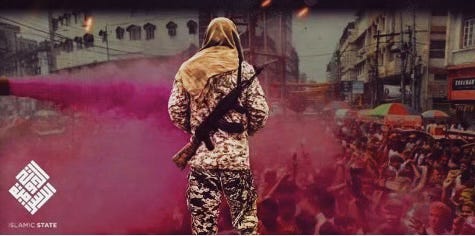Exposing the Caliphate Threat: Islamic State's poster propaganda and conspiracy against India
The Islamic State (IS) and its regional affiliates, such as Islamic State Khorasan Province (ISKP) and Islamic State Hind Province (ISHP) and their local units, have been persistently threatening India through ideological propagation, online recruitment, and localized terror conspiracies for over a decade now. This brief provides an overview of Islamic State-related activities in India in 2025, assessing the evolving nature of IS operations in the region. The analysis also examines the propaganda tactics (e.g., posters) used by Islamic State-linked groups to radicalize and recruit individuals.
Unearthing IS Activities in India
Islamic State’s Poster Targeting Hindu Festival Holi, March 17, 2025
Tamil Nadu Radicalization hotspots: On January 28, the National Investigation Agency (NIA) conducted searches at 16 locations in Tamil Nadu in connection with the ongoing Islamic State radicalization and recruitment case linked to the 2022 Coimbatore temple car bomb blast. Intelligence inputs highlighted that IS sympathizers made multiple attempts to radicalize youth in Tamil Nadu, particularly in the Coimbatore and Tirupur areas. Secret meetings were organized to discuss IS ideology, and online platforms were used extensively to spread extremist propaganda. Law enforcement agencies closely monitor these activities, leading to several preventive detentions.
Earlier, in Mid 2024, the NIA had charged four individuals—Jameel Basha, Mohammed Hussain, Irshath, and Syed Abdur Rahman, under relevant sections of the Indian Penal Code (IPC) and the Unlawful Activities Prevention Act (UAPA). The investigation revealed that IS follower Jamesha Mubeen drove a car carrying an Improvised Explosive Device (IED), which exploded near the Kottai Sangameshwarar Temple on Eswaran Kovil Street, Ukkadam, Coimbatore, on October 23, 2022. For this case, NIA and State intelligence agencies conducted multiple raids and sweep operations earlier across several IS hotspots in Tamil Nadu and Telangana. The NIA found earlier during investigations that the arrested operatives, including Jameel Basha, had expressed admiration for Zahran Hashim as an inspirational figure, the Sri Lankan Islamic State (IS) jihadist who orchestrated the April 2019 Easter Sunday bombings, which killed over 250 civilians.
In a parallel development, in January 2025, the arrest of Abdul Basith, an IS sympathizer from Chennai (Tamil Nadu), highlights the expansion of IS's digital recruitment ecosystem in India. Basith, who was employed in an ambulance service, was found to be running multiple social media accounts and WhatsApp groups with restricted access, specifically targeting teenagers and young adults for radicalization. His use of encrypted communication platforms and targeted digital propaganda exemplifies the modern recruitment strategies employed by IS to bypass traditional counterterrorism surveillance. The seizure of electronic evidence, including mobile devices, pen drives, and Islamist extremist literature, suggests a well-coordinated online effort to indoctrinate vulnerable individuals into IS's jihadist ideology. This case, in particular, has been significant recently as it demonstrates how individual IS recruiters, operating under the radar, can exploit social media to build sleeper cells and funding networks. The arrest of Basith is a critical success in India's counterterrorism strategy. Still, it also underscores the urgent need for enhanced digital intelligence gathering and community engagement programs to counter extremist narratives before they take root among susceptible youth. Agencies should now investigate Basith's chequered past and ongoing activities in places where he traveled, stayed, or interacted with numerous Muslim youths. Mapping his local network in those cities could expose his radicalization efforts and actual reach in Tamil Nadu and neighboring States.
For the complete article, See Militant Monitor, March 24, 2025
Animesh Roul, Executive Director, Society for the Study of Peace and Conflict, New Delhi.
